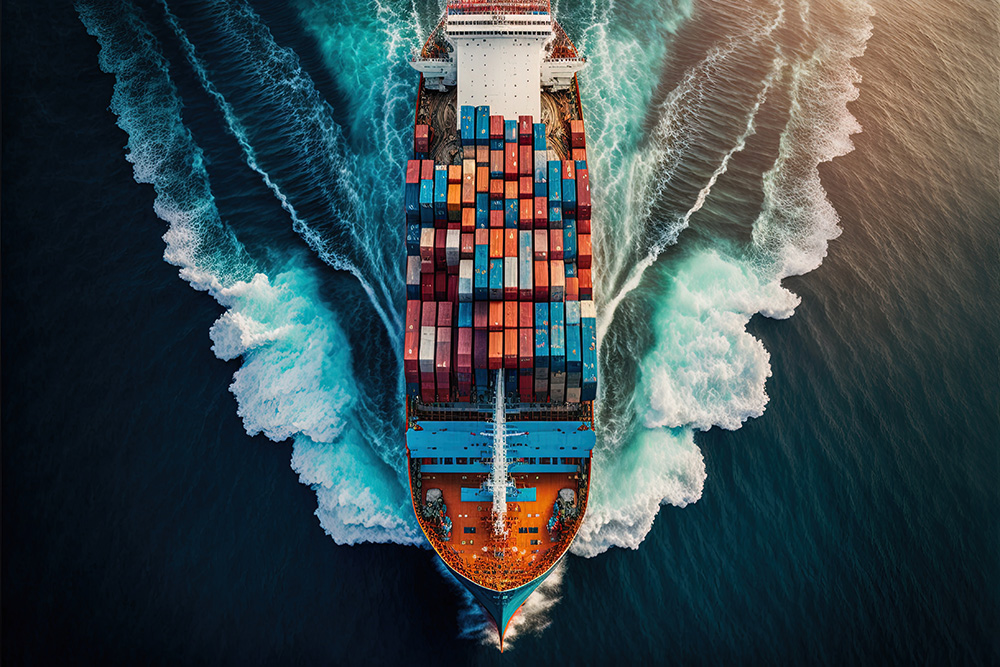REALIABLE,
FLEXIBLE,
PERSONAL,
DIGITAL.
Elbfair Logistics GmbH is your international logistics partner. Thanks to our global network, we have experience in all types of freight. Whatever you need to ship – normal freight, hazardous materials, urgent shipments or important documents – simply hand over your shipment to us and we will take care of the rest.

AIR FREIGHT
- Full charter
- Partial charter
- Hazardous goods
- Consul
- Project shipments
- Pre- and on-carriage
- Packing of loading units in own warehouse
- AOG Express
- On board courier

SEA FREIGHT
- Electronic export customs clearance
- Electronic preparation for overseas import customs clearance
- Repackaging or repackaging according to international standards
- European service office
- FCL shipments (full container) / LCL shipments (consolidated container)
- Break bulk shipments / OOG shipments
- RO/RO shipments
- Organisation of pre- and on-carriage
- General cargo and groupage transports

RAIL FREIGHT
- LCL
- FCL

TRUCK FREIGHT
- Partial and full loads
- Groupage transport
- Local transport
- Distribution transport
- Special and urgent transports
- Hazardous goods
- Fair and event transports
- Regulated agent for aviation security
- National and international transports
ALONE YOU ARE STRONG, TOGETHER YOU ARE UNBEATABLE.
You work with a team that reacts quickly to your needs and reliably takes care of the handling. With our complete solutions, you can concentrate on your core business.

FAQs
Do you have any further questions?
Local transport in freight forwarding is an important part of the logistics industry. It involves the transport of goods within a specific geographical area, such as a city or region. In contrast to long-distance transport, where goods are transported over long distances, local transport is designed for short distances.
Local transport is of great importance to many companies as it enables them to transport their goods quickly and efficiently. In particular, local transport is indispensable for the retail sector, as it enables companies to deliver their goods to their customers quickly and reliably.
Local transport usually uses smaller vehicles, such as delivery vans or pick-up trucks. These vehicles can be used flexibly and can be manoeuvred easily even in narrow streets and alleys. In addition, they are usually equipped with modern technology, such as GPS systems, which enable precise navigation.
Another advantage of local transport is that it is more environmentally friendly than long-distance transport. Since the transport routes are shorter, less fuel is consumed and fewer emissions are produced. In addition, companies can also use alternative forms of propulsion in local transport, such as electric or hybrid vehicles.
However, there are also challenges in local transport. Especially in cities, it can be difficult to transport goods quickly and efficiently, as there are often traffic obstructions and congestion. In addition, local transport vehicles often have to make several deliveries per day, which can put a lot of strain on drivers.
To overcome these challenges, many companies in local transport rely on modern technologies and logistics solutions. For example, route optimisation software and telematics systems can be used to optimise transport routes and avoid traffic congestion. Cooperation with other companies and the use of joint logistics centres can also help to make local transport more efficient and environmentally friendly.
Overall, local transport in freight forwarding is an important part of the logistics industry. It enables companies to transport their goods quickly and reliably and helps to reduce environmental pollution. By using modern technologies and logistics solutions, the challenges in local transport can be overcome and the transport of goods in cities and regions can be further optimised.
Long-distance transport plays an important role in transport and is an essential part of the logistics industry. It refers to the transport of goods over long distances, often between different cities or countries.
Long-distance transport includes different means of transport, such as trucks, trains, ships and planes. Different means of transport are used depending on the type of goods and the distance. Trucks, for example, are ideal for transporting goods over short to medium distances, while ships and planes are preferred for transport over long distances.
Long-distance transport offers many advantages. It enables the transport of large quantities of goods over long distances and allows companies to offer their products to national and international markets. Long-distance transport allows companies to optimise their supply chains and deliver to their customers efficiently.
Efficient organisation of long-distance transport is of great importance. Scheduling plays a decisive role in this. Scheduling involves the planning and organisation of transports, the selection of suitable means of transport and the determination of optimal routes. Good scheduling makes it possible to minimise transport costs and optimise delivery times.
However, long-distance transport is also associated with challenges. Long distances and different means of transport require precise planning and coordination. Traffic and customs regulations must be observed to ensure smooth transports. In addition, unforeseen events such as traffic jams, weather conditions or technical problems can lead to delays.
Modern technologies are used to make long-distance transport more efficient. GPS tracking enables real-time monitoring of transports and helps to track deliveries. Automated inventory management systems facilitate the control of goods and allow orders to be processed more quickly.
Please provide us with the following:
- Telex Release Bill of Lading
- Commercial Invoice
- Packing List
- German description of goods
- Customs tariff number
- Material of the goods
Please note that the CI, PL and the TLX HBL must all match 100%.
Scheduling plays a crucial role in the logistics industry. It refers to the planning and organisation of transports, stocks and other logistical processes. Efficient scheduling is of great importance to keep the supply chain running smoothly and cost-effectively.
Scheduling includes various tasks, such as determining the optimal transport routes, selecting suitable means of transport and determining the right amount of goods to be transported. Factors such as costs, delivery times and environmental impact must be taken into account.
An important aspect of scheduling is warehousing. This involves planning inventory levels so that there are enough goods to meet demand, but at the same time there are no excess stocks. Efficient stock management minimises costs and enables orders to be processed more quickly.
Disposition is also closely linked to transport planning. Here, the various means of transport, such as trucks, ships or planes, are coordinated and the optimal routes are determined. Factors such as the availability of the means of transport, delivery times and costs must be taken into account.
Good scheduling requires precise planning and continuous monitoring of logistical processes. Modern technologies such as GPS tracking and automated inventory management systems can help here. These enable real-time monitoring of transports and accurate inventory control.
Efficient scheduling can lead to significant cost savings. Logistics costs can be significantly reduced by optimising transport routes and reducing inventory. At the same time, efficient scheduling can also lead to faster delivery of goods, which increases customer satisfaction.
However, scheduling is not only relevant for companies, but also for society as a whole. Efficient logistics helps to reduce traffic congestion and environmental pollution. By planning optimal transport routes, unnecessary journeys can be avoided and CO2 emissions reduced.
Overall, scheduling is an important part of the logistics industry. It enables efficient planning and organisation of transports and stocks. Good scheduling can lead to significant cost savings and at the same time increase customer satisfaction. By using modern technologies, logistics processes can be made even more efficient.
Elbfair Logistics offers you an all-round service in the area ofAmazon FBA & FBM. Every Amazon request can be handled without any problems - below you will find our services:
- Customs clearance, import & export by sea, rail, air, as well as via truck with our own fleet.
- Individual processing of your requirements
- Warehousing in our 12000 sqm Pre FBA & FBM warehouse
- Digital inventory control system
- Outbound Next-Day Guarantee – we ship your goods within a maximum of 24 hours
- We deliver to all Amazon warehouses worldwide
- Value Added Services: Relabelling, goods inspection, quality management
- No out of stock at Amazon due to our performance-oriented work
TSL Vectura, a company of Dynamo Group GmbH, offers several weekly rail departures from China from various regions.
With our own block trains we offer you the best possible reliability. Rail freight represents the golden mean between sea and air freight and enables time- and cost-efficient transport in the field of general cargo (LCL) and full container loads (FCL).
Our Block Trains depart from:
- Zhengzhou
- Wuhan
- Changsha
- Chengdu
- Hefei
The pre-carriage from all regions in China can also be carried out by us. The delivery time is between 15-17 days.
Our worldwide partner branches will help you to arrange your transport as efficiently and cost-effectively as possible.
We will be happy to advise you.
Do you have an enquiry? We look forward to hearing from you at tsl@dynamo-group.de or on 0176 411 36 930.
Elbfair Logistics GmbH, offers a large number of departures worldwide, which can be adapted to your delivery times. We offer worldwide groupage (LCL) and full container (FCL) shipping for both import and export.
Not only promotional items, household goods or goods for everyday use are part of our core business. We are also happy to support you in the import and export of canned goods, automotive goods and hazardous goods. We are also reliably positioned in the field of e-commerce and support you with our experienced import team from A for enquiry to Z for delivery.
Our worldwide partner branches will help you to arrange your transport as efficiently and cost-effectively as possible.
A letter of credit is a promise of payment from an importer to a shipper, secured by banks. The procedure and uniform customs have been issued by the International Chamber of Commerce, but are not binding.
After the purchase contract has been drawn up, the importer instructs his bank to open a letter of credit for the exporter. The bank checks the order and receives all data, such as description of goods, packing list, transport documents, as well as the deadlines for shipment.
If the credit line is sufficient, the bank informs another bank in the exporter's country about the letter of credit and, upon presentation of all documents, undertakes to make payment to the shipper. After dispatch and verification of the documents, the L/C bank makes payment to the shipper.
This procedure mainly serves to protect both parties. The sender receives his money safely if the order is handled correctly and the consignee receives his goods at the agreed conditions.
We work customer-oriented and find individual solutions.
We transport your goods punctually and safely
to their destination.
We attach importance to sustainable solutions and advise you on the best possible options.

